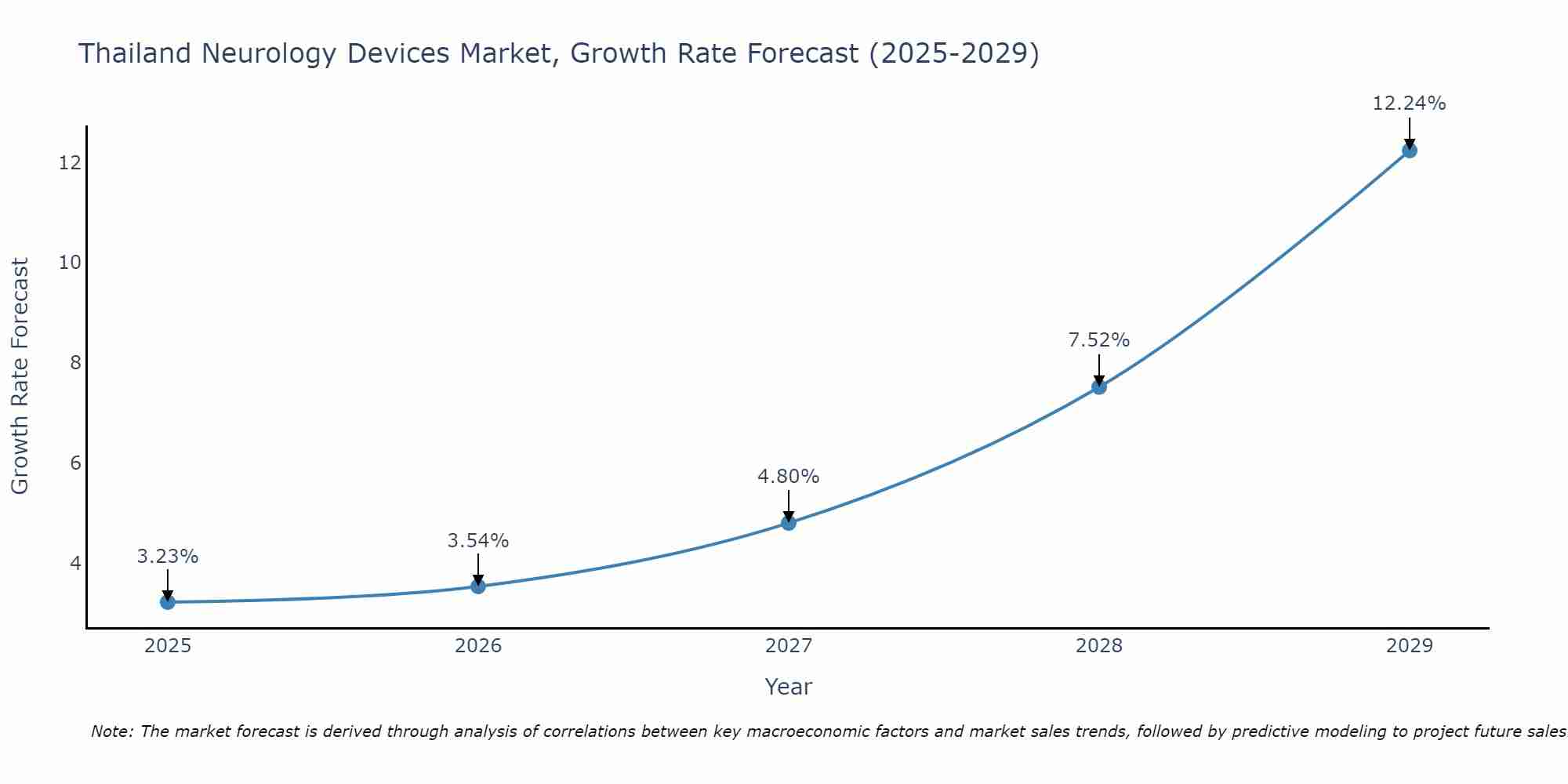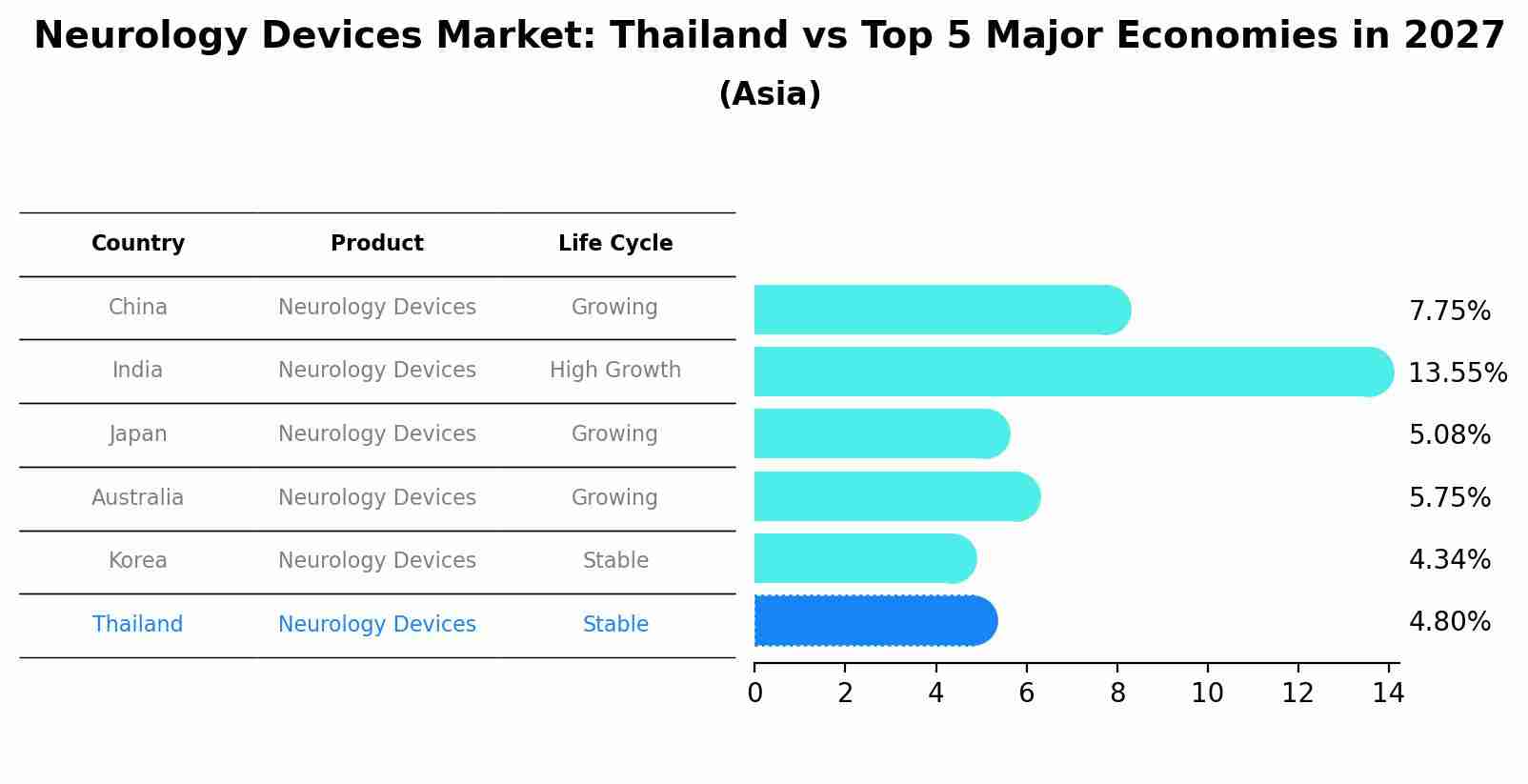Thailand Neurology Devices Market (2025-2031) Outlook | Analysis, Forecast, Companies, Trends, Size, Share, Industry, Value, Revenue & Growth
| Product Code: ETC367645 | Publication Date: Aug 2022 | Updated Date: Apr 2025 | Product Type: Market Research Report | |
| Publisher: 6Wresearch | No. of Pages: 75 | No. of Figures: 35 | No. of Tables: 20 | |
Thailand Neurology Devices Market Size Growth Rate
The Thailand Neurology Devices Market is likely to experience consistent growth rate gains over the period 2025 to 2029. The growth rate starts at 3.23% in 2025 and reaches 12.24% by 2029.

Neurology Devices Market: Thailand vs Top 5 Major Economies in 2027 (Asia)
The Neurology Devices market in Thailand is projected to grow at a stable growth rate of 4.80% by 2027, within the Asia region led by China, along with other countries like India, Japan, Australia and South Korea, collectively shaping a dynamic and evolving market environment driven by innovation and increasing adoption of emerging technologies.

Thailand Neurology Devices Market Synopsis
The Thailand Neurology Devices Market plays a vital role in the healthcare sector, as it provides essential diagnostic and therapeutic solutions for neurological disorders. With an aging population and increasing awareness about neurological diseases, the demand for neurology devices in Thailand has been steadily rising. This market includes a wide array of products such as neuroimaging equipment, electroencephalography (EEG) devices, neurostimulation devices, and neuromonitoring equipment. Advancements in technology, coupled with collaborations between healthcare institutions and device manufacturers, have contributed to the market`s growth. The adoption of these devices is crucial for early diagnosis, treatment, and management of neurological conditions, making them a cornerstone in the Thai healthcare system.
Drivers of the Market
The neurology devices market in Thailand is experiencing significant growth driven by several factors. Firstly, the aging population in the country has led to an increase in neurological disorders, such as Alzheimer`s and Parkinson`s disease, driving the demand for diagnostic and treatment devices. Secondly, advancements in neurology technology, including brain imaging and neuromodulation devices, have expanded the range of treatment options available to patients. Additionally, the healthcare sector`s focus on improving neurological care and research has boosted the adoption of neurology devices. The growing awareness of mental health issues has also contributed to the market`s growth.
Challenges of the Market
The neurology devices market in Thailand faces a range of challenges. One major obstacle is the limited healthcare infrastructure and resources in rural areas, which can hinder access to neurology services and devices for a significant portion of the population. Additionally, there is a shortage of skilled neurologists and technicians, which can affect the proper utilization of advanced neurology devices. Regulatory and reimbursement issues can also slow down the introduction of innovative neurology devices in the market. Finally, the high cost of some neurology devices can be prohibitive for both healthcare facilities and patients.
COVID-19 Impact on the Market
The Thailand neurology devices market experienced disruptions during the COVID-19 pandemic. Non-urgent medical procedures were postponed, affecting the demand for neurology devices used in diagnostics and treatment. Supply chain challenges and delays in approvals for new medical technologies further impacted the market. However, as the healthcare system adapted to the ongoing crisis, the importance of neurology devices for diagnosing and managing neurological conditions became evident. The market began to recover, with increased investments in telehealth and remote monitoring solutions, emphasizing the need for advanced neurology devices in both hospitals and outpatient settings.
Key Players in the Market
In the neurology devices market in Thailand, notable companies include Medtronic plc, Abbott Laboratories, Boston Scientific Corporation, and Siemens Healthineers. These firms manufacture a variety of neurology devices used in diagnostics and treatments.
Key Highlights of the Report:
- Thailand Neurology Devices Market Outlook
- Market Size of Thailand Neurology Devices Market, 2024
- Forecast of Thailand Neurology Devices Market, 2031
- Historical Data and Forecast of Thailand Neurology Devices Revenues & Volume for the Period 2021-2031
- Thailand Neurology Devices Market Trend Evolution
- Thailand Neurology Devices Market Drivers and Challenges
- Thailand Neurology Devices Price Trends
- Thailand Neurology Devices Porter's Five Forces
- Thailand Neurology Devices Industry Life Cycle
- Historical Data and Forecast of Thailand Neurology Devices Market Revenues & Volume By Product for the Period 2021-2031
- Historical Data and Forecast of Thailand Neurology Devices Market Revenues & Volume By Neurostimulation Devices for the Period 2021-2031
- Historical Data and Forecast of Thailand Neurology Devices Market Revenues & Volume By Neurosurgery Devices for the Period 2021-2031
- Historical Data and Forecast of Thailand Neurology Devices Market Revenues & Volume By Interventional Neurology Devices for the Period 2021-2031
- Historical Data and Forecast of Thailand Neurology Devices Market Revenues & Volume By Cerebrospinal fluid management devices for the Period 2021-2031
- Historical Data and Forecast of Thailand Neurology Devices Market Revenues & Volume By Others for the Period 2021-2031
- Historical Data and Forecast of Thailand Neurology Devices Market Revenues & Volume By End User for the Period 2021-2031
- Historical Data and Forecast of Thailand Neurology Devices Market Revenues & Volume By Hospitals for the Period 2021-2031
- Historical Data and Forecast of Thailand Neurology Devices Market Revenues & Volume By Ambulatory surgery centers for the Period 2021-2031
- Historical Data and Forecast of Thailand Neurology Devices Market Revenues & Volume By Neurology clinics for the Period 2021-2031
- Thailand Neurology Devices Import Export Trade Statistics
- Market Opportunity Assessment By Product
- Market Opportunity Assessment By End User
- Thailand Neurology Devices Top Companies Market Share
- Thailand Neurology Devices Competitive Benchmarking By Technical and Operational Parameters
- Thailand Neurology Devices Company Profiles
- Thailand Neurology Devices Key Strategic Recommendations
Frequently Asked Questions About the Market Study (FAQs):
- Single User License$ 1,995
- Department License$ 2,400
- Site License$ 3,120
- Global License$ 3,795
Search
Related Reports
- Saudi Arabia Manlift Market (2025-2031) | Outlook, Size, Growth, Trends, Companies, Industry, Revenue, Value, Share, Forecast & Analysis
- Uganda Excavator, Crane, and Wheel Loaders Market (2025-2031) | Strategy, Consumer Insights, Analysis, Investment Trends, Opportunities, Growth, Size, Share, Industry, Revenue, Segments, Value, Segmentation, Supply, Forecast, Restraints, Outlook, Competition, Drivers, Trends, Demand, Pricing Analysis, Competitive, Strategic Insights, Companies, Challenges
- Rwanda Excavator, Crane, and Wheel Loaders Market (2025-2031) | Strategy, Consumer Insights, Analysis, Investment Trends, Opportunities, Growth, Size, Share, Industry, Revenue, Segments, Value, Segmentation, Supply, Forecast, Restraints, Outlook, Competition, Drivers, Trends, Demand, Pricing Analysis, Competitive, Strategic Insights, Companies, Challenges
- Kenya Excavator, Crane, and Wheel Loaders Market (2025-2031) | Strategy, Consumer Insights, Analysis, Investment Trends, Opportunities, Growth, Size, Share, Industry, Revenue, Segments, Value, Segmentation, Supply, Forecast, Restraints, Outlook, Competition, Drivers, Trends, Demand, Pricing Analysis, Competitive, Strategic Insights, Companies, Challenges
- Angola Excavator, Crane, and Wheel Loaders Market (2025-2031) | Strategy, Consumer Insights, Analysis, Investment Trends, Opportunities, Growth, Size, Share, Industry, Revenue, Segments, Value, Segmentation, Supply, Forecast, Restraints, Outlook, Competition, Drivers, Trends, Demand, Pricing Analysis, Competitive, Strategic Insights, Companies, Challenges
- Israel Intelligent Transport System Market (2025-2031) | Strategy, Consumer Insights, Analysis, Investment Trends, Opportunities, Growth, Size, Share, Industry, Revenue, Segments, Value, Segmentation, Supply, Forecast, Restraints, Outlook, Competition, Drivers, Trends, Demand, Pricing Analysis, Competitive, Strategic Insights, Companies, Challenges
- Uganda Precast and Aggregate Market (2025-2031) | Strategy, Consumer Insights, Analysis, Investment Trends, Opportunities, Growth, Size, Share, Industry, Revenue, Segments, Value, Segmentation, Supply, Forecast, Restraints, Outlook, Competition, Drivers, Trends, Demand, Pricing Analysis, Competitive, Strategic Insights, Companies, Challenges
- Australia IT Asset Disposal Market (2025-2031) | Strategy, Consumer Insights, Analysis, Investment Trends, Opportunities, Growth, Size, Share, Industry, Revenue, Segments, Value, Segmentation, Supply, Forecast, Restraints, Outlook, Competition, Drivers, Trends, Demand, Pricing Analysis, Competitive, Strategic Insights, Companies, Challenges
- UAE Building Thermal Insulation Market Outlook (2025-2031) | Revenue, Companies, Share, Trends, Growth, Size, Forecast, Industry, Analysis & Value
- Portugal Electronic Document Management Market (2025-2031) | Strategy, Consumer Insights, Analysis, Investment Trends, Opportunities, Growth, Size, Share, Industry, Revenue, Segments, Value, Segmentation, Supply, Forecast, Restraints, Outlook, Competition, Drivers, Trends, Demand, Pricing Analysis, Competitive, Strategic Insights, Companies, Challenges
Industry Events and Analyst Meet
Our Clients
Whitepaper
- Middle East & Africa Commercial Security Market Click here to view more.
- Middle East & Africa Fire Safety Systems & Equipment Market Click here to view more.
- GCC Drone Market Click here to view more.
- Middle East Lighting Fixture Market Click here to view more.
- GCC Physical & Perimeter Security Market Click here to view more.
6WResearch In News
- Doha a strategic location for EV manufacturing hub: IPA Qatar
- Demand for luxury TVs surging in the GCC, says Samsung
- Empowering Growth: The Thriving Journey of Bangladesh’s Cable Industry
- Demand for luxury TVs surging in the GCC, says Samsung
- Video call with a traditional healer? Once unthinkable, it’s now common in South Africa
- Intelligent Buildings To Smooth GCC’s Path To Net Zero













